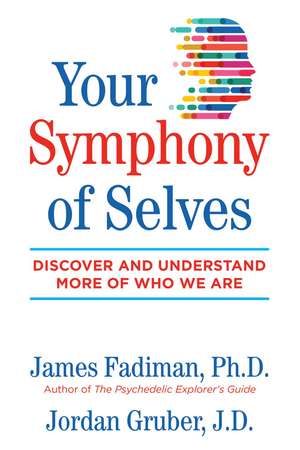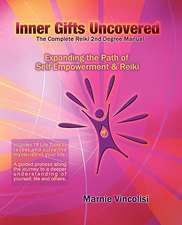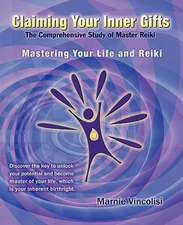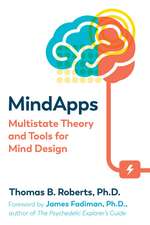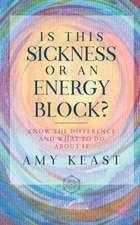Your Symphony of Selves: Discover and Understand More of Who We Are
Autor James Fadiman Ph.D., Mr. Jordan Gruberen Limba Engleză Paperback – 16 sep 2020
• Reveals that each of us is made up of multiple selves, any of which can come to the forefront in different situations
• Offers examples of healthy multiple selves from psychology, neuroscience, pop culture, literature, and ancient cultures and traditions
• Explores how to harmonize our selves and learn to access whichever one is best for a given situation
Offering groundbreaking insight into the dynamic nature of personality, James Fadiman and Jordan Gruber show that each of us is comprised of distinct, autonomous, and inherently valuable “selves.” They also show that honoring each of these selves is a key to improved ways of living, loving, and working.
Explaining that it is normal to have multiple selves, the authors offer insights into why we all are inconsistent at times, allowing us to become more accepting of the different parts of who we and other people are. They explore, through extensive reviews, how the concept of healthy multiple selves has been supported in science, popular culture, spirituality, philosophy, art, literature, and ancient traditions and cite well-known people, including David Bowie and Beyoncé, who describe accessing another self at a pivotal point in their lives to resolve a pressing challenge.
Instead of seeing the existence of many selves as a flaw or pathology, the authors reveal that the healthiest people, mentally and emotionally, are those that have naturally learned to appreciate and work in harmony with their own symphony of selves. They identify “the Single Self Assumption” as the prime reason why the benefits of having multiple selves has been ignored. This assumption holds that we each are or ought to be a single consistent self, yet we all recognize, in reality, that we are different in different situations.
Offering a pragmatic approach, the authors show how you can prepare for situations by shifting to the appropriate self, rather than being “switched” or “triggered” into a sub-optimal part of who you are. They also show how recognizing your selves provides increased access to skills, talent, and creativity; enhanced energy; and improved healing and pain management. Appreciating your diverse selves will give you more empathy toward yourself and others. By harmonizing your symphony of selves, you can learn to be “in the right mind at the right time” more often.
Preț: 117.98 lei
Nou
Puncte Express: 177
Preț estimativ în valută:
22.58€ • 23.49$ • 18.64£
22.58€ • 23.49$ • 18.64£
Carte disponibilă
Livrare economică 24 martie-07 aprilie
Livrare express 08-14 martie pentru 33.71 lei
Preluare comenzi: 021 569.72.76
Specificații
ISBN-13: 9781644110263
ISBN-10: 1644110261
Pagini: 448
Ilustrații: 94 b&w illustrations
Dimensiuni: 152 x 229 x 25 mm
Greutate: 0.58 kg
Editura: Inner Traditions/Bear & Company
Colecția Park Street Press
ISBN-10: 1644110261
Pagini: 448
Ilustrații: 94 b&w illustrations
Dimensiuni: 152 x 229 x 25 mm
Greutate: 0.58 kg
Editura: Inner Traditions/Bear & Company
Colecția Park Street Press
Notă biografică
James Fadiman, Ph.D., with degrees from Harvard and Stanford, was the president of two companies, taught at four universities, is an international seminar leader, and has written textbooks, trade books, and novels. Consulting clients have included IBM, Hewlett-Packard, a Federal Reserve bank, and Foster's Freeze. He is one of the foremost researchers in microdosing studies and is a co-founder of Sophia University. He has been researching healthy multiplicity for over 20 years and lives with his filmmaker wife In Menlo Park, California. Jordan Gruber, J.D., writer, collaborative writer, ghost writer, and editor, has forged and sculpted authoritative volumes in forensic law, financial services, and self-development. A graduate of Binghamton University and the University of Virginia School of Law, he founded the Enlightenment.com website and is now a leading advocate of rebound exercise through the SuperBound Project. He lives in Menlo Park, California, with his wife and family.
Extras
Chapter 1. What This Is About and What We Hope to Accomplish
All human beings, including those who are healthiest and most successful, are composed of more than one self. When things are going well, each plays its rightful role as part of a harmonious symphony. We really are different people--or have different minds, parts, or personalities--in different moments and in different contexts.
This is not a new observation; it goes back thousands of years. And it is not difficult to understand, at least not in its basic form. Instead, it is extremely useful and beneficial. By appreciating this about ourselves and others, many things in our lives begin to make more sense.
Please consider the following questions:
• Have you ever argued with yourself? Who were you arguing with? Who was the other voice, or other voices? If you have ever argued with yourself and changed sides, who did that? Have you ever been by yourself or with your old friends and done something truly wild and crazy--something you would never do around your parents, children, co-workers, or boss? Who was it that acted that way? Was that same part of you embarrassed later on?
• Have you ever gotten so inebriated that you said or did things that you would normally never do, or caused physical or psychological damage to yourself or someone else? Who did that? Who got the hangover? And who eventually felt the shame or regret?
• Have you ever been so stressed that you did something you told yourself you would never do? Once you did it--or perhaps even while you were doing it--did another part of you already know you were making a big mistake?
Acknowledging these different parts of ourselves is what this book is all about. To say, for example that people merely have different “moods” at different times misses our main thrust: the selves that comprise us are actual, real, independent, and innately valuable parts of who we are.
In addition to addressing questions like these, we will offer many examples from ordinary day-to-day life, some of which will likely remind you of similar experiences in your own life. We will also make frequent reference to popular culture: books, movies, music, and cartoons. Finally, we will discuss the thoughts of a wide range of thinkers, writers, scientists, and artists who have grappled with this issue throughout history.
The collected and synthesized information we are providing here might at first puzzle you or disturb your equilibrium, or even up-end your theory of yourself and others. But it will likely change how you view and understand yourself (your selves) and others (their selves).
As you read, we are hopeful you will do at least two things:
• Begin to let go of the ways you tend to characterize who you are as a single, unitary, monolithic self; and
• Begin to accept and appreciate your own selves and the selves of others. These things--relatively easy to do--often provide immediate benefits (as will be described).
Most of our ideas are easy to understand, and may feel very familiar to you. They seem to make sense to most people once, based on their own life experiences, they bring them to awareness. For many, the prospect of living a better life--consciously noticing and working with what we are describing--proves an enticing possibility.
How the Single Self Assumption Limits Optimal Human Functioning
The difficult part--the problem we all face--is that this way of looking at things is so rarely discussed that most people simply are not aware of it. A veil seems to exist that prevents us from directly experiencing or considering the idea that we are--or can be--a collection of harmonious healthy selves. (Going forward, we will refer to the “healthy selves” or “healthy normal selves” idea, worldview, or perspective.) This barrier or veil follows directly from the unexamined pervasiveness of what we call the Single Self Assumption, which in its simplest form, is the idea that:
Each of us is a single unified self.
As a result of the pervasiveness of the Single Self Assumption, the reality of experiencing ourselves as a healthy multiplicity is seldom considered. If it is brought up, it may be laughed away or simply dismissed.
But, when we become aware of, question, and step beyond the Single Self Assumption, our worldview shifts. This alternative posits that greater health, functioning, and satisfaction comes to people who understand and make practical good use of the recognition that selves are real.
The new assumption is that it is normal to have more than one self. Perhaps more importantly, optimal functioning and well-being necessitates acknowledging and working with all of our selves. Those who do this demonstrate increasing congruence between their words, behavior, and plans. They are seen by others as being coherent in their interactions and communications. They are also kinder and more compassionate.
Acknowledging and working with selves thus enables us to be more congruent, coherent, and overall, what we describe as being more cohesive. Simply, they “hang together” in a well-integrated way. The more cohesive our selves are, the better our real-world functioning and our interactions and relationships (how we are felt, seen, and experienced).
To begin our discussion, here is an example of someone famous--literally a major rock star--who made effective use of his selves.
R.I.P. David Bowie, Master of Selves Changes
Following Bowie’s death in early 2016, Helen Green’s animated gif of his many looks--his many faces, perhaps his many selves--went viral. Did Bowie consciously make use of--deploy or even invent--different selves when necessary?
Bowie himself said: “Even though I was very shy, I found I could get onstage if I had a new identity.” After reviewing his troubled early years, British psychologist Oliver James wrote, “What seems to have been the trigger for his shift from distressed and tortured to emotionally healthy, was his adoption of personas in his musical career.”(3)
All human beings, including those who are healthiest and most successful, are composed of more than one self. When things are going well, each plays its rightful role as part of a harmonious symphony. We really are different people--or have different minds, parts, or personalities--in different moments and in different contexts.
This is not a new observation; it goes back thousands of years. And it is not difficult to understand, at least not in its basic form. Instead, it is extremely useful and beneficial. By appreciating this about ourselves and others, many things in our lives begin to make more sense.
Please consider the following questions:
• Have you ever argued with yourself? Who were you arguing with? Who was the other voice, or other voices? If you have ever argued with yourself and changed sides, who did that? Have you ever been by yourself or with your old friends and done something truly wild and crazy--something you would never do around your parents, children, co-workers, or boss? Who was it that acted that way? Was that same part of you embarrassed later on?
• Have you ever gotten so inebriated that you said or did things that you would normally never do, or caused physical or psychological damage to yourself or someone else? Who did that? Who got the hangover? And who eventually felt the shame or regret?
• Have you ever been so stressed that you did something you told yourself you would never do? Once you did it--or perhaps even while you were doing it--did another part of you already know you were making a big mistake?
Acknowledging these different parts of ourselves is what this book is all about. To say, for example that people merely have different “moods” at different times misses our main thrust: the selves that comprise us are actual, real, independent, and innately valuable parts of who we are.
In addition to addressing questions like these, we will offer many examples from ordinary day-to-day life, some of which will likely remind you of similar experiences in your own life. We will also make frequent reference to popular culture: books, movies, music, and cartoons. Finally, we will discuss the thoughts of a wide range of thinkers, writers, scientists, and artists who have grappled with this issue throughout history.
The collected and synthesized information we are providing here might at first puzzle you or disturb your equilibrium, or even up-end your theory of yourself and others. But it will likely change how you view and understand yourself (your selves) and others (their selves).
As you read, we are hopeful you will do at least two things:
• Begin to let go of the ways you tend to characterize who you are as a single, unitary, monolithic self; and
• Begin to accept and appreciate your own selves and the selves of others. These things--relatively easy to do--often provide immediate benefits (as will be described).
Most of our ideas are easy to understand, and may feel very familiar to you. They seem to make sense to most people once, based on their own life experiences, they bring them to awareness. For many, the prospect of living a better life--consciously noticing and working with what we are describing--proves an enticing possibility.
How the Single Self Assumption Limits Optimal Human Functioning
The difficult part--the problem we all face--is that this way of looking at things is so rarely discussed that most people simply are not aware of it. A veil seems to exist that prevents us from directly experiencing or considering the idea that we are--or can be--a collection of harmonious healthy selves. (Going forward, we will refer to the “healthy selves” or “healthy normal selves” idea, worldview, or perspective.) This barrier or veil follows directly from the unexamined pervasiveness of what we call the Single Self Assumption, which in its simplest form, is the idea that:
Each of us is a single unified self.
As a result of the pervasiveness of the Single Self Assumption, the reality of experiencing ourselves as a healthy multiplicity is seldom considered. If it is brought up, it may be laughed away or simply dismissed.
But, when we become aware of, question, and step beyond the Single Self Assumption, our worldview shifts. This alternative posits that greater health, functioning, and satisfaction comes to people who understand and make practical good use of the recognition that selves are real.
The new assumption is that it is normal to have more than one self. Perhaps more importantly, optimal functioning and well-being necessitates acknowledging and working with all of our selves. Those who do this demonstrate increasing congruence between their words, behavior, and plans. They are seen by others as being coherent in their interactions and communications. They are also kinder and more compassionate.
Acknowledging and working with selves thus enables us to be more congruent, coherent, and overall, what we describe as being more cohesive. Simply, they “hang together” in a well-integrated way. The more cohesive our selves are, the better our real-world functioning and our interactions and relationships (how we are felt, seen, and experienced).
To begin our discussion, here is an example of someone famous--literally a major rock star--who made effective use of his selves.
R.I.P. David Bowie, Master of Selves Changes
Following Bowie’s death in early 2016, Helen Green’s animated gif of his many looks--his many faces, perhaps his many selves--went viral. Did Bowie consciously make use of--deploy or even invent--different selves when necessary?
Bowie himself said: “Even though I was very shy, I found I could get onstage if I had a new identity.” After reviewing his troubled early years, British psychologist Oliver James wrote, “What seems to have been the trigger for his shift from distressed and tortured to emotionally healthy, was his adoption of personas in his musical career.”(3)
Cuprins
Acknowledgments
Note to the Reader: Not So Radical After All
SECTION I
Welcome from All of Us to All of You
ONE What This Is About and What We Hope to Accomplish
TWO The Benefits of the Healthy Selves Model
THREE Mental Health Is Being in the Right Mind at the Right Time
SECTION II
Multiplicity All Around Us Cultural and Intellectual Reflections
FOUR Language, Voices, and Popular Culture
FIVE Souls and Selves in Religion and Philosophy
SIX Many Minds on Many Minds Psychologists and Multiplicity
SEVEN At the Convergence of Buddhism, Science, and Postmodern Thinking
SECTION III
Understanding, Acknowledging, and Working with Our Selves
EIGHT Selves Explanations Origins, Attributes, and Roles
NINE How Selves Cooperate Metaphors and Models
TEN Tools, Techniques, and Strategies for Selves Work
SECTION IV
Healthy Normal Selves in the Twenty-First Century
ELEVEN Spiritual, Therapeutic, and Sociocultural Responses
TWELVE From the Traditional Continuum to the Expanded Full Spectrum
THIRTEEN Recaps, Reflections, Reminders
APPENDIX Dissociation Origins and Usage; Problems and Suggestions
Notes
Bibliography
Index
Note to the Reader: Not So Radical After All
SECTION I
Welcome from All of Us to All of You
ONE What This Is About and What We Hope to Accomplish
TWO The Benefits of the Healthy Selves Model
THREE Mental Health Is Being in the Right Mind at the Right Time
SECTION II
Multiplicity All Around Us Cultural and Intellectual Reflections
FOUR Language, Voices, and Popular Culture
FIVE Souls and Selves in Religion and Philosophy
SIX Many Minds on Many Minds Psychologists and Multiplicity
SEVEN At the Convergence of Buddhism, Science, and Postmodern Thinking
SECTION III
Understanding, Acknowledging, and Working with Our Selves
EIGHT Selves Explanations Origins, Attributes, and Roles
NINE How Selves Cooperate Metaphors and Models
TEN Tools, Techniques, and Strategies for Selves Work
SECTION IV
Healthy Normal Selves in the Twenty-First Century
ELEVEN Spiritual, Therapeutic, and Sociocultural Responses
TWELVE From the Traditional Continuum to the Expanded Full Spectrum
THIRTEEN Recaps, Reflections, Reminders
APPENDIX Dissociation Origins and Usage; Problems and Suggestions
Notes
Bibliography
Index
Recenzii
“Kudos to the authors for their diligent research, original thinking, and courageous pioneering that changes the foundational assumptions of modern psychology to more closely resemble who we truly are.”
“Rigorous, engaging, and pleasurable to read. I’m ecstatic about their ennobling upgrade in the understanding of what it means to be human.”
“This wonderful book urges us to look at ourselves and our lives in an entirely new way. We are not a single self, the authors teach us, but rather we contain multiple selves, each valuable in its own way. This lovely book will help you understand and embrace who you are and who you could be.”
“This masterful, comprehensive exploration of the diversity within us is both fascinating and useful. With grace and erudition, the authors explore the nooks and crannies of our minds--and in the variety of ‘selves’ they find there is, paradoxically, a profound and healing sense of wholeness and freedom.”
“This book exquisitely explores the age-old and yet seemingly new theme that we are made up of different ‘moving parts.’ Talking to yourself is not just reserved for eccentric people on subways but an inner psychodrama that can lead us toward a more integrated, ‘together,’ symphonic self. Now I can, and will, tell clients: ‘Read this book, and then come back and talk to me!’”
“This insightful book creates a landscape of perspective with profound implications for understanding the psychology of human beings. A must-read for every person interested in self-discovery.”
“A profound, brilliant, and convincing account of the many entities that make up each of us. I hope it will have the success and influence it deserves.”
“Based on what I’ve read in this book, I now more clearly recognize some of my own selves: my scientist self, my personal growth self, my spiritual self, my ‘Am I kind of crazy sometimes?’ self . . .and all of them are getting valuable ideas and practices to become more harmonious. My thanks to Fadiman and Gruber for this remarkable book!”
“A tour de force on the multiple manifestations--scientifically, artistically, religiously, and culturally--of the multiple persons and personalities each one of us inhabits. No matter how skeptical your point of view before you read this book, it will make you think, and you will take it seriously.”
“Astoundingly, my various persona all seem to agree that Fadiman and Gruber have unpacked this complex topic in ways that are factual, insightful, and extremely useful--a must-read for most, if not all, of your selves.”
“From the microbiome in our gut to the voices in our heads, each of us is a community, as the authors explain in this fascinating, delightful book. The illusion of a single unitary self interferes with clear thinking about everything from immunology to psychiatry to the nature of community. We are each a symphony of selves, and my selves highly recommend this book to your selves.”
“In clear, practical prose, and drawing from a wealth of religious, philosophical, and psychological materials, the authors make a strong, clear case that is brilliantly couched as a seductive invitation: just stop believing you are a single self, and start to orchestrate and befriend the varied and fractious clan that you are.”
“James Fadiman has consistently been walking, exploring, and illuminating the cutting edge of culture for the past half century. This book is no exception, and with it, Fadiman and his scholarwriter partner, Jordan Gruber, intellectually investigate and prosaically dance in a way that recognizes and honors the many voices within us all.”
“This is a very special book! This idea of a ‘symphony of selves’ reflects what has always been understood among indigenous peoples--and so the book digs deeply into essential universal truths. A treasure to enjoy and learn with and from.”
“The idea that our sense of self is illusory and that we all contain different selves may seem strange at first. But the great accomplishment of Your Symphony of Selves is that it doesn’t just make this idea perfectly sensible, the authors show how it can help us better understand ourselves and how cultivating and integrating those multiple selves makes us healthier and happier.”
“A tour de force that pulls together insights from psychiatry, philosophy, religion, neurology, the humanities, and the social and behavioral sciences. Profound, yet entertaining, it plumbs deeply into rarely explored depths of the human psyche. It even contains activities and exercises that its readers can employ, soon realizing that they may never be the same again.”
“My cousin James Fadiman has an uncanny ability to take a problem, turn it calmly in his hands, look at it from many angles, and solve it, always with a glint of amusement in his eye. Until I read this book he wrote with Gruber, it had never occurred to me that what enables those multiple angles is his sense that he isn’t confined to a single self. He is a team! The ideas in this book seem simple, but that’s the point: why make things hard when they could be easy?”
“Nowhere are Fadiman and Gruber’s words ‘being in the right mind at the right time’ more applicable than for the military fighter pilot. The world moving, quite literally, at Mach 1 creates an unforgiving cauldron where incoherent or incongruent thought yields catastrophic results. The difference between life and death depends on fighter pilots finding their mental best selves.”
“In this fascinating book, the authors offer insights that enable us to kindly accept and value ourselves and others. They reveal an incredible opportunity for healthier living through embracing our different selves, leading to psychological cohesion and wholeness.”
"Psychology professor Fadiman (The Psychedelic Explorer’s Guide) and lawyer Gruber systematically explore the idea that all humans comprise multiple selves in this engaging yet dense work. Arguing against Freudian theory and the popular presentation of personality multiplicity as a dysfunction, the authors posit that the 'selves' within a person are much more than just moods, rather they’re 'recurring patterns of mindbody energy, chemistry, energy, perception, and behavior' that manifest in behavior and physiology...their efforts to reframe and destigmatize the idea of multiple selves will appeal to general readers interested in the nature of human behavior."
“The information in this book was a wonderful confirmation of what I had felt and known for many years. Therefore, I heartily and happily recommend it to all and everyone. Deep within your psyche are treasures undreamed of.”
“Rigorous, engaging, and pleasurable to read. I’m ecstatic about their ennobling upgrade in the understanding of what it means to be human.”
“This wonderful book urges us to look at ourselves and our lives in an entirely new way. We are not a single self, the authors teach us, but rather we contain multiple selves, each valuable in its own way. This lovely book will help you understand and embrace who you are and who you could be.”
“This masterful, comprehensive exploration of the diversity within us is both fascinating and useful. With grace and erudition, the authors explore the nooks and crannies of our minds--and in the variety of ‘selves’ they find there is, paradoxically, a profound and healing sense of wholeness and freedom.”
“This book exquisitely explores the age-old and yet seemingly new theme that we are made up of different ‘moving parts.’ Talking to yourself is not just reserved for eccentric people on subways but an inner psychodrama that can lead us toward a more integrated, ‘together,’ symphonic self. Now I can, and will, tell clients: ‘Read this book, and then come back and talk to me!’”
“This insightful book creates a landscape of perspective with profound implications for understanding the psychology of human beings. A must-read for every person interested in self-discovery.”
“A profound, brilliant, and convincing account of the many entities that make up each of us. I hope it will have the success and influence it deserves.”
“Based on what I’ve read in this book, I now more clearly recognize some of my own selves: my scientist self, my personal growth self, my spiritual self, my ‘Am I kind of crazy sometimes?’ self . . .and all of them are getting valuable ideas and practices to become more harmonious. My thanks to Fadiman and Gruber for this remarkable book!”
“A tour de force on the multiple manifestations--scientifically, artistically, religiously, and culturally--of the multiple persons and personalities each one of us inhabits. No matter how skeptical your point of view before you read this book, it will make you think, and you will take it seriously.”
“Astoundingly, my various persona all seem to agree that Fadiman and Gruber have unpacked this complex topic in ways that are factual, insightful, and extremely useful--a must-read for most, if not all, of your selves.”
“From the microbiome in our gut to the voices in our heads, each of us is a community, as the authors explain in this fascinating, delightful book. The illusion of a single unitary self interferes with clear thinking about everything from immunology to psychiatry to the nature of community. We are each a symphony of selves, and my selves highly recommend this book to your selves.”
“In clear, practical prose, and drawing from a wealth of religious, philosophical, and psychological materials, the authors make a strong, clear case that is brilliantly couched as a seductive invitation: just stop believing you are a single self, and start to orchestrate and befriend the varied and fractious clan that you are.”
“James Fadiman has consistently been walking, exploring, and illuminating the cutting edge of culture for the past half century. This book is no exception, and with it, Fadiman and his scholarwriter partner, Jordan Gruber, intellectually investigate and prosaically dance in a way that recognizes and honors the many voices within us all.”
“This is a very special book! This idea of a ‘symphony of selves’ reflects what has always been understood among indigenous peoples--and so the book digs deeply into essential universal truths. A treasure to enjoy and learn with and from.”
“The idea that our sense of self is illusory and that we all contain different selves may seem strange at first. But the great accomplishment of Your Symphony of Selves is that it doesn’t just make this idea perfectly sensible, the authors show how it can help us better understand ourselves and how cultivating and integrating those multiple selves makes us healthier and happier.”
“A tour de force that pulls together insights from psychiatry, philosophy, religion, neurology, the humanities, and the social and behavioral sciences. Profound, yet entertaining, it plumbs deeply into rarely explored depths of the human psyche. It even contains activities and exercises that its readers can employ, soon realizing that they may never be the same again.”
“My cousin James Fadiman has an uncanny ability to take a problem, turn it calmly in his hands, look at it from many angles, and solve it, always with a glint of amusement in his eye. Until I read this book he wrote with Gruber, it had never occurred to me that what enables those multiple angles is his sense that he isn’t confined to a single self. He is a team! The ideas in this book seem simple, but that’s the point: why make things hard when they could be easy?”
“Nowhere are Fadiman and Gruber’s words ‘being in the right mind at the right time’ more applicable than for the military fighter pilot. The world moving, quite literally, at Mach 1 creates an unforgiving cauldron where incoherent or incongruent thought yields catastrophic results. The difference between life and death depends on fighter pilots finding their mental best selves.”
“In this fascinating book, the authors offer insights that enable us to kindly accept and value ourselves and others. They reveal an incredible opportunity for healthier living through embracing our different selves, leading to psychological cohesion and wholeness.”
"Psychology professor Fadiman (The Psychedelic Explorer’s Guide) and lawyer Gruber systematically explore the idea that all humans comprise multiple selves in this engaging yet dense work. Arguing against Freudian theory and the popular presentation of personality multiplicity as a dysfunction, the authors posit that the 'selves' within a person are much more than just moods, rather they’re 'recurring patterns of mindbody energy, chemistry, energy, perception, and behavior' that manifest in behavior and physiology...their efforts to reframe and destigmatize the idea of multiple selves will appeal to general readers interested in the nature of human behavior."
“The information in this book was a wonderful confirmation of what I had felt and known for many years. Therefore, I heartily and happily recommend it to all and everyone. Deep within your psyche are treasures undreamed of.”
